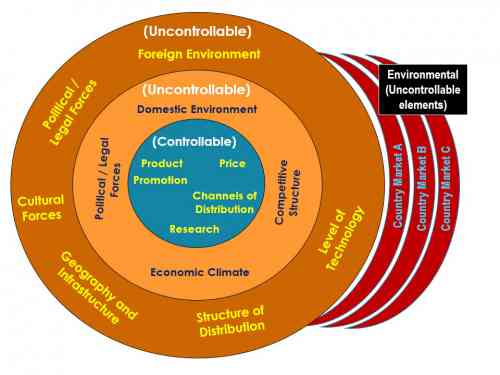International marketers face many challenges while entering into foreign markets. Therefore, the job of an international marketer is more complicated than a
domestic marketer. International marketer deals with two levels of
uncontrollable uncertainty which is created by uncontrollable elements of all
business environments. But each foreign country, in which the business
operates, adds its own distinctive set of uncontrollable factors.
 |
| International Marketers face great challenges in foreign markets. (Photo by QuinceMedia) |
The figure below elucidates the total environment of a foreign
market. The innermost circle represents the domestic controllable elements that
establish a marketer's decision area. The second circle represents those
environmental factors at domestic that have some effect on foreign-marketing
decisions. The outer circle represents the elements of the foreign market
environment in which business runs. As the external circles show, each foreign
market in which the company does business can present distinctive issues
involving some or all of the uncontrollable elements.
Consequently, the more international markets in which a company
does business, the greater the possible variety of foreign environment factors
with which to resist. Mostly, a solution to a problem in country market ‘A’ is
not applicable to a problem in country market ‘B’.
 |
| Environmental factors that effect the international marketing. |
Marketing Decision Factors
The successful manager develops a marketing plan designed for
optimum adjustment to the uncertainty of the business environment. The
innermost circle in above Figure signifies the area under control of a
marketing manager. Supposing the necessary overall corporate resources, the
marketing manager blends price, product, promotion, and distribution channels
to benefit from projected demand. The controllable features can be changed in
long-run and commonly in short-run to regulate the changing market environment,
buyer tastes and behavior, and business goals.
Aspects of Domestic Environment
The second circle in above Figure shows the aspect of domestic
environment uncontrollable that is mostly beyond the control of businesses
or companies. These domestic environment elements include political and legal
forces, economic, and competition that can directly affect the success of a
foreign company. The competition in a domestic country may upset the
international marketer's task and the company’s domestic or international
marketing plans.
Aspects of Foreign Environment
In addition to uncontrollable domestic elements, a substantial
source of uncertainty is the number of factors in foreign environment
uncontrollable (As shown in the outer circle of the Figure above). A
company doing business in home-country absolutely feels comfortable in
forecasting the business environment and adjusting business decisions. The
method of assessing the uncontrollable elements in an international marketing
program, however, often includes considerable measures for the cultural,
political, and economic environment.
A business running in more foreign countries may notice polar
extremes in political stability, class structure, and economic environment. The
dynamic disturbances in some countries additional make a case for the problems
of dramatic changes in political, cultural, and economic climate over
a brief amount of your time. For instance, China has shifted from communist
legal system to commercial legal system. In this phase, new laws are approved
but left to be understood by local authorities, where misunderstanding prevails
as to what rules are still in force and what rules are no longer applicable.
Self-Reference Criterion and Ethnocentrism: Major Impediments
The key to successful foreign marketing is the adjustment to
environmental changes from one market to another. This adjustment is a sensible
effort on the part of an international marketer to forestall the inspirations
of both foreign and domestic uncontrollable factors on a marketing mix and then
to adjust the marketing mix to reduce the effects.
SRC International and associated Ethnocentrism is the main
issue for successful marketing in a foreign country. SRC is an unconscious
reference to one's own cultural values, experiences, and knowledge as a basis
for decisions. Closely connected is ethnocentrism, that is, the concept that
one's own culture or company knows best how to do things.
In the beginning of
21st century, Ethnocentrism was a particular issue for American
managers because of America's supremacy in the world economy during
the 1990s. Ethnocentrism is a common problem that marketing managers from
prosperous countries face while working with markets in poor countries. Both
the SRC and ethnocentrism hamper the ability to evaluate a foreign market in
its true light.
Cross-Cultural Management in International Business
To avoid mistakes in business plans, it is essential to conduct a
cross-cultural analysis that segregates the SRC influences and to preserve
vigilance regarding ethnocentrism. The following steps are suggested as a
framework for such an analysis:
§ Define the business issues or goals in home-country cultural
traits, habits, or norms.
§ Define these issue or goals through consultation with natives of
the target country and make no value judgments.
§ Segregate the SRC influence in the problem and evaluate it
prudently to see how it complicates the problem.
§ Redefine the problem without the SRC influence and solve for the
optimal business goal situation.
Once a company decides to do business in international markets, it
must decide the degree of marketing involvement and promise. These decisions
should reflect considerable study and analysis of market potential and company
competencies. Many companies tentatively enter into international markets, grow
to gain experience and gradually change strategies and tactics to become more
committed. The others enter into foreign markets after research & study
and with mature long-term marketing plans. They get ready themselves to make
investments in foreign markets to obtain the market position.
Summary
The globalization of American businesses is proceeding with
growing pace. Such globalization and competition compel all managers to pay
attention to the global environment. The international marketing task is becoming
scarier because of environmental elements such as laws, customs, and cultures
vary from country to country. These environmental variations must be taken into
account if firms are to market products and services at a profit in foreign
countries.
The main hindrance facing international marketers are not limited
to environmental issues but also the difficulties associated with marketer's
own self-reference criteria and ethnocentrism. Both the difficulties bound the
international marketer's ability to understand and adapt to changes prevalent
in foreign marketers. A global awareness and sensitivity are the best solutions
to these issues.
There are three different strategic orientations found among
international marketing managers. Some companies see international marketing as
secondary to domestic marketing. The other kind of companies understand
international marketing as a vital source of sales revenue generation, but each
market is treated as a separate entity. Finally, a global orientation
interprets the globe as a marketplace and market segments are no longer based
solely on national borders. Moreover, the common consumer characteristics and
behaviors create key segmentation variables applied across countries.


